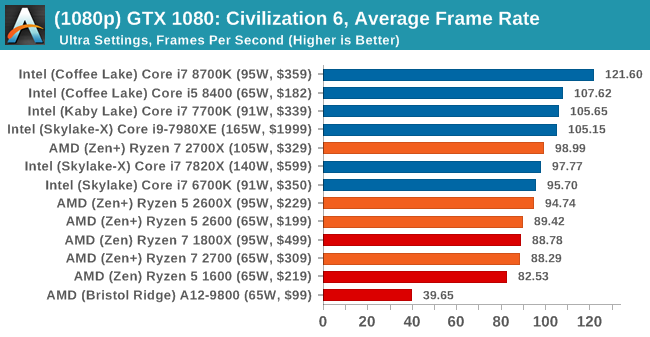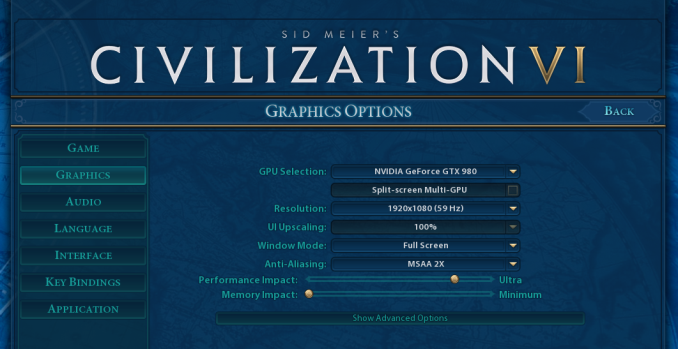The AMD 2nd Gen Ryzen Deep Dive: The 2700X, 2700, 2600X, and 2600 Tested
by Ian Cutress on April 19, 2018 9:00 AM ESTCivilization 6
First up in our CPU gaming tests is Civilization 6. Originally penned by Sid Meier and his team, the Civ series of turn-based strategy games are a cult classic, and many an excuse for an all-nighter trying to get Gandhi to declare war on you due to an integer overflow. Truth be told I never actually played the first version, but every edition from the second to the sixth, including the fourth as voiced by the late Leonard Nimoy, it a game that is easy to pick up, but hard to master.
Benchmarking Civilization has always been somewhat of an oxymoron – for a turn based strategy game, the frame rate is not necessarily the important thing here and even in the right mood, something as low as 5 frames per second can be enough. With Civilization 6 however, Firaxis went hardcore on visual fidelity, trying to pull you into the game. As a result, Civilization can taxing on graphics and CPUs as we crank up the details, especially in DirectX 12.
Perhaps a more poignant benchmark would be during the late game, when in the older versions of Civilization it could take 20 minutes to cycle around the AI players before the human regained control. The new version of Civilization has an integrated ‘AI Benchmark’, although it is not currently part of our benchmark portfolio yet, due to technical reasons which we are trying to solve. Instead, we run the graphics test, which provides an example of a mid-game setup at our settings.
At both 1920x1080 and 4K resolutions, we run the same settings. Civilization 6 has sliders for MSAA, Performance Impact and Memory Impact. The latter two refer to detail and texture size respectively, and are rated between 0 (lowest) to 5 (extreme). We run our Civ6 benchmark in position four for performance (ultra) and 0 on memory, with MSAA set to 2x.
For reviews where we include 8K and 16K benchmarks (Civ6 allows us to benchmark extreme resolutions on any monitor) on our GTX 1080, we run the 8K tests similar to the 4K tests, but the 16K tests are set to the lowest option for Performance.
All of our benchmark results can also be found in our benchmark engine, Bench.
MSI GTX 1080 Gaming 8G Performance
1080p



4K



8K



16K
















545 Comments
View All Comments
mapesdhs - Saturday, April 21, 2018 - link
Not an argument.0ldman79 - Thursday, April 19, 2018 - link
In the real world we have to choose depending on features and performance while constrained by a budget.For intellectual discussion and better understanding of the chips and architecture we need direct comparison.
Both arguments work for entirely different reasons. I rarely have the budget for high end Intel. I'm also into overclocking and run VM, so the only way I hit both of those is to run AMD.
I've also got a few apps that really take advantage of AVX2 and AVX512, which even the Ryzen gets monstrously stomped by Intel.
If you judge by a single metric you're missing the big picture. Everything is a compromise.
Ninjawithagun - Thursday, April 19, 2018 - link
Actually, the comparison between the 2600X (not 2700X) and the 8700K is based upon multiple metrics, not just one.Ninjawithagun - Thursday, April 19, 2018 - link
Once again incorrect. Cost vs. Cost is only one of many factors to consider, but is not a main one, especially if the competition has a processor of equal quality for much less cost. Comparing an Intel 6 core/12 thread CPU to an AMD 8 cores/16 thread CPU makes absolutely no sense if you are measuring cost vs. performance. Your argument makes no sense, sorry.LurkingSince97 - Thursday, April 19, 2018 - link
Once again incorrect. Cost vs Cost is the primary factor for a buyer on a budget. It is the main one.Case in point, if I can get a 2600X for the same price as a much slower Intel chip, it is obviously better.
Comparing a $300+ chip to a $200+ one makes absolurely no sense if you are measuring cost vs. performance. Your argument makes no sense, sorry.
See what I did there? Your argument (and the one above) are BS. You are either a troll, or have a serious intellectual disability. Price, performance, and implementation details (core count) are all independent dimensions and you can look at any of them from the perspective of the other.
Price just happens to be the constraint that most shoppers have to start with. They can vary the other parameters, within the price constraint.
A others with more money might instead lock in a performance / feature set requirement and _then_ consider price, but that is the minority.
fallaha56 - Thursday, April 19, 2018 - link
Well saidI suggested the chap apply his own facile argument and compare threadripper to the 8700k...
gglaw - Saturday, April 21, 2018 - link
They compared multiple "qualities" of processors between two Ryzen generations and CL. If you want to look at them core for core, is it that hard to shift your eyes 3 lines up to see the next line of results? Do you want them to exclude the 2700X since there isn't a consumer level CL to match it?LurkingSince97 - Thursday, April 19, 2018 - link
Price and absolute performance are paramount. Comparing at raw architecture levels is interesting but less important.In the real world, there are consumers who are not that price sensitive, in which case they only care about a top end part that is within their range. They don't care if it is 10 core/ 20 thread vs 8 core /16 thread or 6 core 12 thread -- they care about the raw performance for what they need, and are usually willing to go up in cost somewhat for that performance (including mobo/ram costs). This is the sort of consumer I am today.
There are then others who are price sensitive and have a budget. For these people the price tag is paramount. The flaw with this review (and most in general) is that it does not include mobo / ram / etc costs and often just looks at the CPU price alone. For someone budget conscious they have to carefully consider whether saving $100 on a CPU or $50 on a mobo can give them the ability to spend that on say, a better GPU or nicer monitor. For those, comparing products by price point is way more important than comparing them by architecture. This is the sort of consumer I was when I was a poor college student / gamer that had to part together my own systems with very limited budgets.
As a tech geek, I am always interested in the core-for-core or clock-for-clock comparison, but in the real world for purchasing decisions it doesn't matter if a Ryzen with 6 cores/12 threads at 3Ghz is faster or slower than an Intel chip with 6 cores/12 threads at 3Ghz. In the end, they can have different core counts, threads, and Ghz -- all that matters is the actual performance.
Targon - Monday, April 23, 2018 - link
In the case of Ryzen, you can use the same motherboard from the first generation to the second, or the third, or the fourth(in 2020). You may not get all the features, but they will work, and CPU cost is the only thing needed since you already have the other components.Actual performance is the correct focus, but game performance isn't the same as rendering performance, or for those who tend to have 8+ programs open as a part of their normal work environment. Just saying "performance" ignores that what you use your computer for isn't necessarily the same as what other people use their computer(s) for.
Targon - Monday, April 23, 2018 - link
That is why they use different game benchmarks. Some do make use of more cores/threads, and others make use of other design differences between different products. Price vs. performance is a very valid comparison based on workload, not just games, but in other tasks. You could have higher core count processors with lower clock speeds at the same price point, even when looking at Intel. 6-core lower speed, or 4-core higher speed at the same price point. Which does better for the tasks you personally care about? Intel 8700K vs. AMD 2700X is the fair comparison, while you will compare the 2600 to the i5, again, due to the price point. When you look at the performance results, you SHOULD in theory, see that these chips match up in terms of performance for the price, though AMD tends to have an advantage these days in multi-threaded tasks, while Intel tends to do better in lightly threaded workloads due to clock speeds.